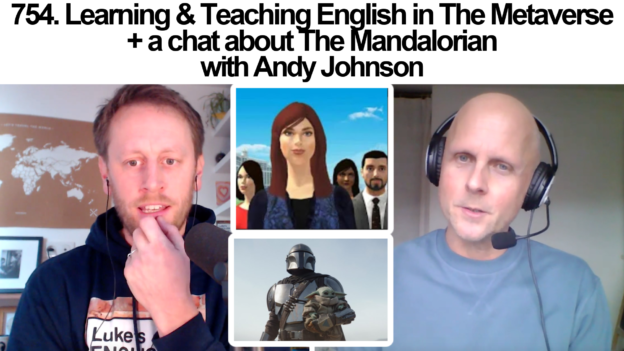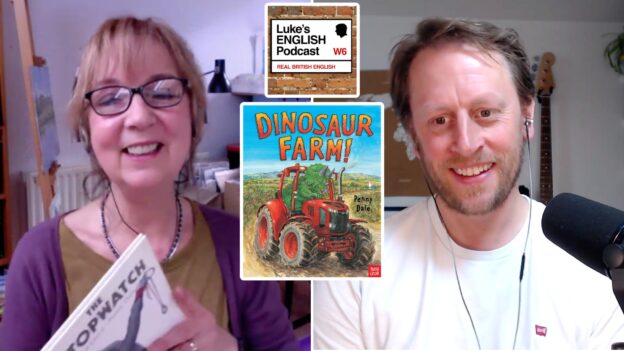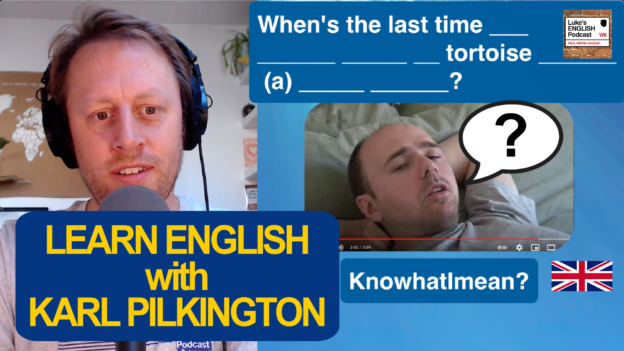Can Luke, Amber & Paul pass this funny Russian citizenship test which was written and sent in by a Russian LEPster? Join us as we attempt to answer questions which (apparently) every Russian person would know. This could be embarrassing!
P.S. I am 99% sure that this really is the final episode of 2021.
Audio Version (No extra rambling this time)
Video Version
👇Read Vadim’s Russian Citizenship Test👇
Russian Citizenship Test
For Luke Tomson
Please answer the following questions. You will get one star (because Russians do like stars) for every correct answer.
Count your correct answers to get your score at the end of the test.
The decision on your Russian citizenship will be made and enforced immediately. Do not close the door (yeah, like it could stop us).
“Good luck” © Bad guy from “Taken”
Question 1.
What animals we have in Russia instead of Tom and Jerry?
- A) Wolf and hare
- B) Bear and bee
- C) Dog and cat
- D) Elephant and mouse
(See the answer below)
The answer is…
A) Wolf and Hare
From the “Nu, Pogodi” (eng. “Well, Just You Wait!” ) animated series, (1969 – 1986).
In the 2014 all-Russian poll “Well, Just You Wait!” won as people’s favorite cartoon/animated series of all time.
The series follows the comical adventures of Wolf, trying to catch – and presumably eat – Hare. The series’ most common line is the eponymous “Nu, pogodi!” yelled by the wolf when his plans fail.
Fun fact: Since the 1990s, when the fall of the Iron Curtain allowed better exchange of films, both Russian and Western audiences have noted similarities between Nu, pogodi! and American cartoons, the most noticeable being Tom and Jerry. The director has admitted that he was learning from Disney animated films which were brought into the USSR from Germany immediately after World War II, particularly Bambi. However, he did not see any Tom and Jerry episodes until his on bought a VCR in 1987.
Question 2
What animal does every Russian see on the streets every day?
- A) Giraffe
- B) Bear
- C) Lynx
- D) Gazelle
The answer is…
D) Gazelle
The GAZelle is a series of light commercial vehicles: pickup trucks, vans and minibuses made by Russian car manufacturer GAZ. Until now, it is actively used in all Russian cities as a “marshrutka” – shuttle or public bus.
Side mission: Can you say “marshrutka”?
Question 3
September 3rd in Russia is a good day to …
- A) Drink vodka from balalaika
- B) Crush wooden sleds with axes
- C) Turn calendar upside down
- D) Hang winter boots out of window
The answer is…
C) Turn calendar upside down
“The third of September” is a well-known Russian lyric song, first performed by Mikhail Shufutinsky in 1993. The chorus of this song contains the lines:
I’ll turn the calendar upside down
And there will be the third of September again
Of course, the singer meant, “I’ll turn a calendar page in a loose-leaf calendar” but many Russians making fun of it. It gave rise to many funny pictures of upside-down calendars. These lines have become a popular meme in Russia, and the third of September in itself has become a kind of holiday, when people joke about the calendar and listen to this song whole day. The singer, by the way, has a positive attitude to this meme and to the popularization of his song among young people.
Question 4
What do Russians expecting the lobster to do on the top of a mountain?
- A) dance
- B) go to war
- C) pray
- D) whistle
The answer is…
D) whistle
“When a lobster whistles on the top of a mountain” – it is a Russian idiom. In fact, it is an adynaton — a figure of speech so hyperbolic that it describes an impossibility. The implication of such a phrase is that the circumstances in question will never occur.
“The pigs will fly when a lobster whistles on the top of a mountain”. Oh, I’d like to see it.
Question 5.
What French name is most often mentioned on the New Year’s Eve in Russia?
- A) Jean-Paul
- B) Olivier
- C) Pierre
- D) Serge
The answer is…
B) Olivier
Olivier salad (Russian: салат Оливье, salat Olivye) is a traditional salad dish in Russian cuisine, which is also popular in other post-Soviet countries. It is usually made with diced boiled potatoes, carrots, brined dill pickles, green peas, eggs, onions, diced boiled chicken or bologna sausage, with salt, pepper, and mustard added to enhance flavor, dressed with mayonnaise. In many countries, the dish is commonly referred to as Russian salad.
In Russia and other post-Soviet states, as well as in Russophone communities worldwide, the salad has become one of the main dishes served during New Year’s Eve (“Novy God”) celebrations.
Additional information: The original version of the salad was invented in the 1860s by a cook of Belgian origin, Lucien Olivier, the chef of the Hermitage, one of Moscow’s most celebrated restaurants. Olivier’s salad quickly became immensely popular with Hermitage regulars, and became the restaurant’s signature dish.
The exact recipe—particularly that of the dressing—was a zealously guarded secret, but it is known that the salad contained grouse, veal tongue, caviar, lettuce, crayfish tails, capers, and smoked duck, although it is possible that the recipe was varied seasonally. The original Olivier dressing was a type of mayonnaise, made with French wine vinegar, mustard, and Provençal olive oil; its exact recipe, however, remains unknown.
Question 6.
What tree do Russians always want to hug when sad?
- A) Larch
- B) Pine
- C) Birch
- D) Baobab
The answer is…
C) Birch
Birch is considered as a tree of “Russian nationality”.
«While traveling for a long time abroad, a Russian often misses his “native birches”. To hold a birch tree tight and cry… that’s the only thing a Russian wants to do in a melancholic mood.
According to multiple folk proverbs and beliefs, ancient pagan Slavs considered hugging a birch tree as a sign of good luck. Birches were compared to humans – its thin trunk was frequently associated with a thin body of a young lady.
Modern Russians would never confess they hug birch trees on a daily basis. However, some of us have done it or at least thought of it. And for sure, when we see those leaves and branches trembling by the wind, our harsh northern hearts melt. And the one certain sign that Russians love birches is the fact that they make fun of it, even creating “go hug a birch” memes and jokes.»
Extract from the article https://www.rbth.com/lifestyle/331832-russians-birch-tree
Question 7.
What is the right way to drink vodka in Russia?
- A) Only for the reason and with lots of food
- B) Looking into each other’s eyes shouting “Na zdorovye!”
- C) In small sips from a large glass
- D) No matter how – it has to be drunk!
The answer is…
A) Only for the reason and with lots of food
Most Russians never drink without a reason. A birthday, wedding, funeral, national holiday – these are all appropriate reasons to drink Vodka. However, it doesn’t need to be so pretentious; you can always make up a good reason for drinking, but the important thing is that you should always have one.
Before you begin drinking, make sure you have something to eat. In Russia we call it “zakuska” – literally means “snack”, but it isn’t that simple. Its history goes back to the traditional Russian ritual of greeting important guests with “bread and salt” – and, in most cases, an alcoholic drink. Other Traditional Russian «zakuska» is cold cuts, cured fishes, mixed salads, kholodets (meat jelly), pirozhki, various pickled vegetables such as tomatoes, cucumbers, sauerkraut, pickled mushrooms, open sandwiches, and breads. The fact is – you should never drink vodka without eating immediately something afterwards.
And here is a fact: Russians never looking into each other eyes while drinking – it would be considered very strange and weird. And they will never shout “Na zdorovye!” NEVER.
Now, let’s count your stars, comrade.
If you got…
7 stars:
Congratulations! From now on, you are officially Russian. You can go to the embassy and get your balalaika. The pet bear will be send to your place later this evening.
5-6 stars:
Nice try, comrade! A couple more shots of vodka and the citizenship will be in your fufaika’s pocket!
2-4 stars:
Well, you will get your citizenship one day, but first you have to ask the lobster to get to the mountain and do some action. Is he still waiting for Gazelle?
0-1 stars:
If only you dare touch a birch, it will turn you upside down, like a calendar!
(Just kidding. It doesn’t matter how many stars you got – everyone is welcome to Russia. Zakuski are waiting for you!)
Thank you for your time and До свидания!































































